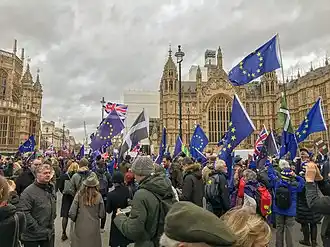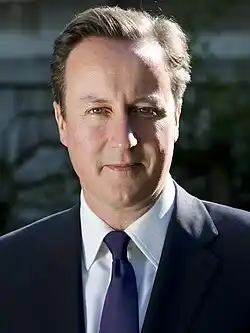
Brexit is the short-hand name given to the exit of the United Kingdom from the European Union. It is a portmanteau meaning ‘British Exit’. This process began in 2016 when a referendum on the issue of Britain remaining a member of the EU was called by Prime Minister David Cameron. The plebiscite was called in an effort to silence Eurosceptics within Cameron’s Conservative Party and it came as a surprise when the British public voted in favor of leaving. The process took several years and unleashed chaos into British politics, but eventually, after endless negotiations and the watering down of the terms of Brexit, the UK left the EU on the 31st of January 2020. The country’s exit from the block has had considerable implications for migration and freedom of movement. Britain has sought to tighten its borders and to allow in fewer migrants, while also removing those who are living illegally in the UK, but this has proved almost impossible to execute in practice. It has also led to other unpredictable developments around national identity, with large numbers of British residents applying for passports from other EU nations during the Brexit process.[1]
Research your ancestors on MyHeritage
Brexit chronology of eventsBrexit chronology of events

The United Kingdom was always a reluctant participant in the European project. When France, the Netherlands, Luxembourg, Belgium, West Germany and Italy decided to form the European Coal and Steel Community in 1951 and then the European Economic Community in 1957 it remained aloof. There were many reasons for this, chief amongst them Britain’s pride in having been the world’s superpower in the nineteenth century, as well as its position as an island nation that perceived itself as lying apart from continental Europe. The English also had a long history going back to the twelfth century of nearly always being at war with France or latterly Germany. In line with this the French vetoed several British applications to join the EEC in the 1950s and 1960s. However, after the Suez Crisis and decolonization robbed Britain of its empire in the late 1950s and early 1960s, and when its economy began to fall behind those of France and Germany, Britain belatedly joined what would become the European Union in 1973.[2]
Even once it joined the European project, Britain remained a truculent member. For instance, it, along with Denmark and Sweden, was one of the only nations that elected not to adopt the Euro currency when it was introduced in 1999, while it also opted out of the Schengen Area of free travel. Even so, many people in British politics wished to exercise an even greater degree of independence from Europe and were perturbed by the growing centralization of power in the hands of the EU institutions in Brussels, Frankfurt and Strasbourg through the Maastricht and Lisbon Treaties of 1992 and 2009.[3]

There was an especially vocal Eurosceptic wing of the British Conservative Party on these issues. To quiet them, the Prime Minister of the UK, David Cameron, announced that a referendum on whether Britain should leave the European Union would be held on the 23rd of June 2016. Cameron, who was pro-Europe, called the election believing it would never be voted in favor of and that defeat would silence the Eurosceptics for a generation. He was surprised when the British public voted 52% in favor of leaving and 48% against. Cameron accepted the referendum as binding and announced he would step down.[4]
Four years of political chaos followed. The UK went through several leaders and changes of personnel at cabinet level. The major issue was coming up with a suite of mechanisms which would allow Britain to exit the EU with all its competences. This was a severely complex issue, much more complex than the simply Yes or No question posed at the ballot box in 2016 had implied. Chief amongst the issues was the 500 kilometer long land border which the UK has with Ireland. It would not be possible to police this and the border would pose all kinds of problems.[5]
Eventually an agreement was reached by Boris Johnson, the new British Prime Minister, in 2019 whereby Britain would leave, albeit while remaining tied to the EU in many ways which more puritanical advocates of Brexit were opposed to, notably by keeping Northern Ireland, a constituent part of the UK, effectively within the EU Common Market, something which negated the need to check all goods that crossed over the border on the island of Ireland.[6] With this in place a much watered-down version of Brexit came into effect on the 31st of January 2020. It had seen years of protests and acrimony in Britain. The Conservative Party had also lurched into a state of permanent crisis in the process and two more changes of Prime Minister occurred before they left office in 2024, the most tumultuous being Liz Truss’s 45 days as leader of the government, during which a controversial emergency budget involving un-costed tax cuts led to severe market turbulence.[7]
Extent of migration caused by BrexitExtent of migration caused by Brexit
The primary goal of Brexit was to stop inward migration into the United Kingdom. Many advocates claimed that the British had lost control over their own borders as a result of EU membership. Indeed, there had been a very large influx of cheaper migrant labor from Eastern European countries like Poland and Romania after they joined the EU in the 2000s, but these also kept the economy competitive and provided much needed labor. Thus, Brexit is a story of trying to curb migration rather than promote it. It has had mixed results. Migration from non-EU countries and regions has actually grown during certain periods, though the Covid-19 Crisis clearly confuses the limited amount of available data.[8] Conversely, there has been a substantial exodus of EU citizens from Britain, many of whom were temporary workers returning to other parts of Europe, or simply continental Europeans who have found the atmosphere created by Brexit unpleasant.
Demographic impact of BrexitDemographic impact of Brexit
The demographic impact of Brexit remains unclear. In decades to come longitudinal studies will be able to reveal exactly how it has impacted on migratory patterns by comparing and contrasting the demographic development of Britain with its European Union neighbors from 2020 onwards. This may reveal that Brexit did lead to a decline in inward migration into the UK, as many advocates of Brexit had sought. Alternatively it may reveal that Britain was unable to curb migration. There is substantive evidence already from the early 2020s to suggest that this is the case.[9] Or indeed it might be the case that Britain opens its borders again anyway in years to come as it realizes that it needs inward migration to counteract the deleterious economic effects of an aging population and its decision to leave the EU Common Market.
See alsoSee also
Explore more about BrexitExplore more about Brexit
- United Kingdom Newspapers from OldNews.com records collection on MyHeritage
- United Kingdom, Deaths, 1980-2023 records collection on MyHeritage
- United Kingdom, Select Burial and Cremation Index, 1840-2014 records collection on MyHeritage
- United Kingdom, Index of Burials records collection on MyHeritage
- United Kingdom, Naturalisation Certificates and Declarations records collection on MyHeritage
- England & Wales, Birth Index, 1837-2005 records collection on MyHeritage
- England & Wales, Marriage Index, 1837-2005 records collection on MyHeritage
- England & Wales, Death Index, 1837-2005 records collection on MyHeritage
- British Genealogy Online at Legacy Family Tree Webinars
- Examining Migration and Researching Migrants in the British Isles at Legacy Family Tree Webinars
References
- ↑ https://www.euronews.com/2020/01/30/brexit-timeline-2016-2020-key-events-in-the-uk-s-path-from-referendum-to-eu-exit
- ↑ https://cepr.org/voxeu/columns/why-did-britain-join-eu-new-insight-economic-history
- ↑ https://www.bbc.co.uk/news/uk-politics-26515129
- ↑ https://www.politico.eu/article/how-david-cameron-lost-brexit-eu-referendum-prime-minister-campaign-remain-boris-craig-oliver-jim-messina-obama/
- ↑ https://www.euronews.com/2020/01/30/brexit-timeline-2016-2020-key-events-in-the-uk-s-path-from-referendum-to-eu-exit
- ↑ https://cepr.org/voxeu/columns/brexit-and-irish-border-issue
- ↑ https://www.theguardian.com/politics/2022/nov/12/revealed-the-30bn-cost-of-liz-trusss-disastrous-mini-budget
- ↑ https://migrationobservatory.ox.ac.uk/resources/briefings/eu-migration-to-and-from-the-uk/
- ↑ https://www.brunel.ac.uk/news-and-events/news/articles/Post-Brexit-UK-migration-trends-and-the-all-time-highs

